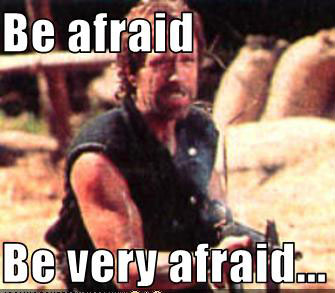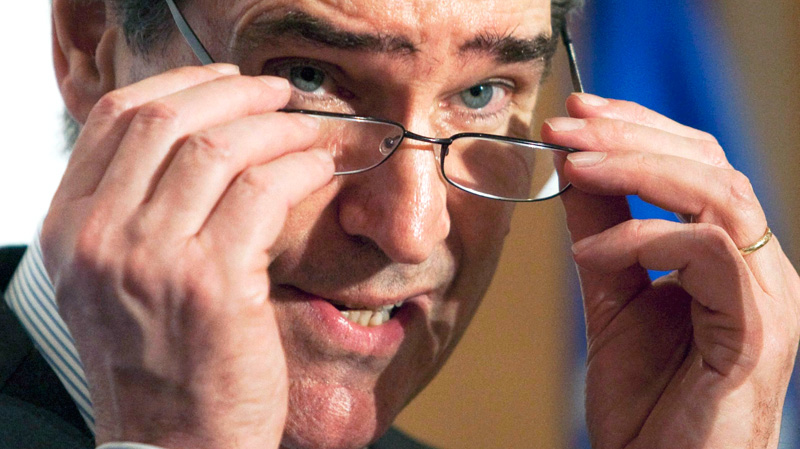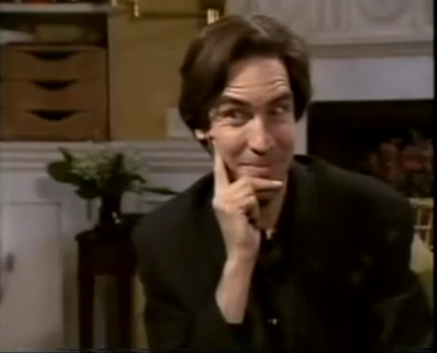Nothing dead certain about end of surprising and unsettling Canadian federal election campaign of 2011
May 1st, 2011 | By Counterweights Editors | Category: In Brief [UPDATED FOR SOME FINAL POLLS, MAY 1, AND FINAL RESULT MAY 3]. With just one day to go (and not quite that right now, to be very exact), Eric Grenier at ThreeHundredEight.com says “all indications are Stephen Harper’s Conservatives will likely win their third consecutive election Monday night. But whether the next government will be a minority or a majority, and who will be facing the Prime Minister across the aisle in the House of Commons [as official opposition], remains unknown.”
[UPDATED FOR SOME FINAL POLLS, MAY 1, AND FINAL RESULT MAY 3]. With just one day to go (and not quite that right now, to be very exact), Eric Grenier at ThreeHundredEight.com says “all indications are Stephen Harper’s Conservatives will likely win their third consecutive election Monday night. But whether the next government will be a minority or a majority, and who will be facing the Prime Minister across the aisle in the House of Commons [as official opposition], remains unknown.”
On the other hand, Forum Research president Lorne Bozinoff reports that “the race is so close, either the NDP or the Conservatives could form [a minority] government, with much riding on splits between the Liberals and NDP support in some ridings, and regional voter preferences.”
Even Mr. Grenier cautions that: “With polling data still pouring in over the weekend, ThreeHundredEight.com’s final seat and vote projections for the campaign won’t be posted until the end of the day.” Or as the young, expatriate Election Watcher at Canadian Election Watch explained yesterday, full “gratification is denied until tomorrow, when, as appears likely, a massive orgy of polls will be upon us, climaxing in a final projection and ropes of accompanying posts in the wee hours of Monday morning.”
We hope to add an update on pollsters’ almost-final prognostications late tonight, while saving the “wee hours of Monday morning” to catch up on all the sleep we’ve lost this past week. (A final update of this sort is now available; click on “Read the rest of this page” below and/or scroll to the bottom.) Meanwhile, we have a few more impressionistic comments on what may be one of the most historic Canadian federal elections in our lifetimes. (And the oldest among us is far too close to starting an eighth decade on planet earth for comfort.)
 To start with, we thought a piece yesterday by Alexander Panetta at The Canadian Press nicely summarized the essential thrust of Campaign 2011: “The Conservatives were wildly inaccurate with their own economic projections in the last election, when they denied mounting evidence that suggested the country was sliding into a recession and budget deficits.” But they nonetheless “entered this campaign determined to make the economy the ballot-box question.”
To start with, we thought a piece yesterday by Alexander Panetta at The Canadian Press nicely summarized the essential thrust of Campaign 2011: “The Conservatives were wildly inaccurate with their own economic projections in the last election, when they denied mounting evidence that suggested the country was sliding into a recession and budget deficits.” But they nonetheless “entered this campaign determined to make the economy the ballot-box question.”
The NDP surge or Orange Crush that has clearly been the campaign’s great surprise did not alter the Harperites’ economy game plan, Mr. Panetta urges: “Now … they are sticking with that message as party insiders say they are nipping at the edges of a majority .. The Tories appear to hope that the scary scenario of socialists wrecking the economy will make voters think twice and send their supporters stampeding to polling stations …Â One thing that hasn’t changed, according to Liberal Leader Michael Ignatieff, is the Conservative strategy. He said the Harper government has spent five weeks fear-mongering … ‘This is the game plan – be afraid. Be very afraid,’ he said in Val d’Or, Que. ‘I mean, they keep picking what you should be most afraid of.’”
* * * *

Liberal leader Michael Ignatieff responds to media questions following a luncheon speech at the Quebec chamber of commerce in Quebec City, Monday, March 14, 2011. (Jacques Boissinot / THE CANADIAN PRESS).
We think Michael Ignatieff is right on the money here – and in much else he has tried to say over the past five weeks, without quite managing to connect with most voters. In the end, we support the two-part editorial in Canada’s largest daily newspaper: “Toronto Star endorses the NDP” and “But vote strategically.” And we’d also second the dissenting reply to the Globe and Mail’s endorsement of the Harper Conservatives by Matthew Hays: “To me, this election goes beyond ideology: it’s about trust. The very fact that Mr. Harper and his entourage could behave in such a dishonest manner and still get The Globe’s endorsement is an indication of how cynical we’ve become about our political process under this government.”
We’d apply Mr. Hays’s comments as well to the Vancouver Sun’s “EDITORIAL: Conservative majority needed to see us through turbulent times.” (How anyone can rationally suggest that any kind of government led by the fearmongering, mercurial, polarizing, and reckless Stephen Harper will be able to see us through turbulent times successfully is beyond our comprehension. And this also applies, alas, to all the other big newspaper endorsements of the Harper Conservative majority concept reported in “What editorial writers are saying about Monday’s election.” No wonder newspapers are in trouble in this day and age!)

Michael Ignatieff listening to Isaiah Berlin tell a story about Ludwig Wittgenstein, from his 1995 interview broadcast on BBC in 1998.
While we support the Toronto Star editorial endorsing the New Democrats, we are also taking the advice But Vote Strategically to heart. And several of us will still be voting Liberal, since we feel that makes the most sense in our own constituencies – and because we believe that some form of NDP-led coalition or similar arrangement (which, if the numbers are right, is no doubt the only serious alternative to a Harper Conservative majority or minority government) will still need the kind of economic and financial expertise and disciplined steady hand that only the Liberals can bring. (On a related front, we are vastly amused by such headlines as “Harper tries to woo Liberals” and “Harper looks to woo blue Liberal voters” in the dying moments of Campaign 2011. If he were leading the old Progressive Conservative party, it might make some sense. But it is just another of the many problems of his approach to government in Canada that he is not.)
Similarly, while we have not been wildly or even slightly enthusiastic about the Liberal leadership of Michael Ignatieff, as Campaign 2011 winds to its inevitable conclusion, we feel a slight urge to offer a sympathetic tip of the hat to him. We agree that he did not really come back for us (and that was unfortunately why the Harper Conservative attack ads against him on this front were so successful). But we are more impressed by him and his Canadian political ambitions now than we were as recently as a few months ago. Time will tell, we think, that more than a few things he has said in this campaign were more sensible than they have yet been given credit for. Jeffrey Simpson’s piece on “The ‘strange death’ of Liberal Canada” this weekend may or may not be the beginnings of an epitaph for the country’s natural governing party from Laurier to Chretien. But if it is, no one can blame Michael Ignatieff for that.

Michael Ignatieff ponders some distinctly non-intellectual news during visit to the Greater Toronto Area in late November 2010.
Finally, we think Chantal Hébert is also right on the money in her column this weekend, headlined “The winner of this campaign? Citizen engagement.” Stephen Harper may once again come up smelling something like at least a rather tattered rose that has been around a bit too long tomorrow night. But if he does not, in one degree or another, it will be because a great surge of the Canadian people – led, as so often in the past in such cases, by the Quebecois nation in a united Canada – has decided not to listen to any of the more established political parties and their many courtiers in the various media.
Or, as Adam Radwanski in a different newspaper has also opined: “this much is safe to say: Jack Layton’s magical rise in this spring’s election has been enormously good for our democracy. Because it has proven that national campaigns really do matter, blowing up the assumption made by Conservative strategists at its outset.” (And, one might add, Liberal strategists too.) Amidst all the cynicism elsewhere, the Canadian people have cast a ray of light. Of course, like everything else, it has its own risks. But, from our corner at least, it says something much more optimistic for the future of Canada.
UPDATE MAY 3: Well it’s all over today! See the counterweights editors on “A historic unnecessary election .. probably .. and now there’s only one party responsible for the next four years” … (And the OMINOUS POSTSCRIPT last poll update below proved closest to the mark!)
POLL UPDATE, MAY 1, 10:45 PM ET. This is still too early for the final poll results from some key players. But a few extra pieces of what may well remain quite a puzzle until the final results from BC tomorrow night have drifted in since our report above was put together earlier today.
It was Frank Graves at EKOS who coined the term “Orange Crush” and helped crystalize wider recognition of just how interesting (and surprising) Campaign 2011 was becoming – and not all that long ago. His first May 1 report today remains intriguing – and for some of us at any rate exciting too: “HOLD ON TO YOUR HATS! CAMPAIGN 41 DRAWING TO A HEART STOPPING CONCLUSION … 34.6% CPC, 31.4% NDP, 20.4% LPC, 6.3% Green, 5.4% BQ, 1.8% other … Using these numbers, and we will reserve the final forecast until later this evening, we would see a Conservative minority where the NDP were within 20 seats and the NDP and the Liberals combined would have a narrow majority between them. This means that if there was common will between the NDP and the Liberals, they would have both the legal (and according to our recent polling on the topic) the moral authority to swiftly dispatch Stephen Harper’s Conservative Party.”
Whether all this could actually happen – and perhaps especially including “if there was common will between the NDP and the Liberals” – certainly remains quite unclear. The last Harris-Decima poll today is, even in just the gross cross-Canada numbers, a bit more favourable for the Conservatives: “The latest Canadian Press/Harris Decima measure of voting intentions reveals: … Nationally, the Conservatives lead by 6 points. Over the latest week, the Conservatives stand at 36%, to 30% for the NDP, 19% for the Liberals, 6% for the BQ, and 6% for the Greens. Over the last two weeks, the Conservatives stand at 35%, to 30% for the NDP, 21% for the Liberals, 6% for the BQ, and 6% for the Greens.”
Two earlier polls may add some further perspective. This morning’s results from Nik Nanos, eg, were not mentioned in our report above: “The Nanos Research tracking poll of results for three days of surveys put support for the Conservatives at 37 percent, down slightly from 38 percent in Saturday’s poll … The NDP had 30.6 percent of decided voters, up from 29.6 percent … The Nanos poll showed Liberal support fell slightly to 22.7 percent from 23.3 percent a day earlier … The separatist Bloc Quebecois, which runs candidates only in the French-speaking province of Quebec, was at 5.5 percent, up from 5.2 percent in Saturday’s poll. Nanos noted the NDP enjoyed a comfortable lead in Quebec with 37.4 percent support there.” (There is one more Nanos poll, reported on below!)
A COMPAS poll reported on yesterday in the Vancouver Sun underlines just how volatile and unpredictable the Canadian federal election of 2011 seems to have become (even though most analysts seem to be viewing it as a distinct outlier: “Findings from the most recent horse race poll from COMPAS suggest the Tories winning a majority with 46 per cent of the total votes. That same poll pegged the NDP at 26 per cent, the Liberals at 17 per cent and the Bloc Quebecois at seven per cent … ‘But here’s the paradox: the NDP is especially unpredictable and can go both ways,’ [COMPAS president Conrad] Winn said … The party’s 26 per cent support could drop to 20 per cent or increase to 36 per cent, depending on the strength of the party’s machine and what voters are thinking during the final hours … “
What about more exact seat predictions? At this exact time, Bryan Breguet at “Too Close To Call” is still reserving his final judgement. But his “May 1st: almost final projections” are calling for “Tories minority, NDP official opposition” – with Conservatives 36% giving 144 seats, New Democrats 30.9% and 89 seats, Liberals 20.9% and 60 seats, Bloc 6.4% and 15 seats, and Greens 5.1% and no seats (again).
At this point as well, Election Watcher at “Canadian Election Watch” has just factored the very last Nanos poll results into his calculations. (The Nanos results are Conservatives 37.1%, New Democrats 31.6%, Liberals 20.5%, BQ 5.7%, Greens 3.8%. ) Election Watcher also offers a provocative comment on Nanos – which throws considerable cold water on the thoughts of Frank Graves at EKOS (even if he did predict Mayor Ford’s victory in Toronto?). While the three-day averages for the Nanos results are as above, the results for just today (albeit with a cross-Canada sample of only 702 decided voters!) put the Conservatives at 38.7% and the NDP at 30.5%. From all this Election Watcher speculates: “just like last year, the Tories’ support increases on the last day before the vote, and last year, it’s Nanos’ last-day numbers that came closest to the mark. Will the Tories win by 8%, more than what every pollster (except COMPAS) has been showing in the past week?” (Presumably by “last year” here Election Watcher means 2008.) This may serve as a sobering prospect for those of us who are hoping for something much closer to what Frank Graves is talking about above. Meanwhile Election Watcher is waiting for the very final word from EKOS himself before making a final seat projection. His current projection is Conservatives 153, NDP 98, Liberals 44, and BQ 13.
Eric Grenier at ThreeHundredEight.com has still not reported his final projection as we write here either. If this and other last minute pieces of intelligence arrive before all of us are too soundly asleep (and some have already left the office!), we may offer a very final update ourselves. (Or not: the headline on this piece at large still strikes us as quite apt in any case!)
A FEW LAST NOTES: Eric Grenier’s “May 1, 2011 Final Projection – Conservative Minority Government” is now available. It predicts for cross-Canada popular vote Conservatives 36.4%, New Democrats 27.3%, Liberals 22.8%, Bloc Quebecois 6.7%, and Greens 5.6%; and for seats Conservatives 143 (the same as last time in 2008), New Democrats 78, Liberals 60, and Bloc Quebecois 27. On this scenario, the New Democrats and Liberals together would still have five fewer seats than the Conservatives. And God only knows how the next few years in Canadian federal politics would (or will?) unfold?
Bryan Breguet’s final projection is similar but also somewhat different. He too gives the Conservatives 143 seats, but with only 35.9% of the cross-Canada vote. But he gives the NDP 93 seats with 31.4% of the vote, Liberals 58 seats with 20.3%, BQ 14 seats with 6.3%, and Greens no seats with 5.2%. In this case the NDP and Liberals combined would have eight seats more than the Conservatives, but would still be four seats short of even a bare majority. As best we can make out, this too qualifies as a God on ly knows scenario.
Frank Graves at EKOS has now made his final projections as well. For what he calls his “Nataional federal vote intention” he gives 33.9% CPC, 31.2% NDP, 21.0% LPC, 6.0% Green 6.4% BQ, and 1.5% other. For what he calls his National federal vote intention indexed for commitment (ie a measure of commitment to actually exercise one’s vote) he gives 34.0% CPC, 31.6% NDP, 20.8% LPC, 5.9% Green, 6.4% BQ, and 1.3% other. From all this he offers the following seat projection ranges: CPC: 130 to 146 seats, NDP: 103 to 123 seats, LPC: 36 to 46 seats, BQ: 10 to 20 seats, GP: 1 seat.
If both the New Democrats and the Liberals achieved near the high end of their ranges on Mr. Graves’s scenario (with the inevitable companion result of the Conservatives dropping close to the low end of their range), the New Democrats and Liberals together would have both more seats than the Conservatives – and an absolute majority of seats in the Canadian House of Commons. Short of a Conservative majority, on some reading of the Nanos and COMPAS results noted above, this would seem to be the most stable prospect for the next few years (assuming the NDP and Liberals really would be ready to work together, of course). But only the evening of May 2 (or perhaps even the early morning of May 3 in some parts of the country?) will finally tell what is actually going to happen. And whatever else, that is what makes this election so interesting – for the moment at least!
OMINOUS POSTSCRIPT? May 01, 2011 23:49 ET … Dr. Lorne Bozinoff’s very last Forum Research poll just came out, and its thrust is rather different from the one commented on in the main body of the text above, from earlier today:
“NDP Surge Stalls, Tories Near Majority … In the final poll conducted by Forum Research among eligible Canadian voters for the May 2nd election, the Conservatives have a slight lead over the NDP (Tories 36%, up from 35% yesterday, and up from 34% on April 27th, 2011; compared to NDP 33% (unchanged from yesterday, but up from 31% on April 27th, 2011). The Liberal party trails with just under one fifth of the popular vote (19%, unchanged from yesterday but down from 22% on April 27th, 2011), followed by the Green party (6% down from 7%), and Bloc Quebecois (5%, unchanged). The 1% gain by the Tories suggests that Stephen Harper’s warnings about an NDP government may be working. Alternatively, massage parlour allegations concerning Jack Layton may have take[n] a slight toll.”
Dr. Bozinoff concludes: “These voting intention results, if held on Election Day, would likely yield approximately 150 Tory seats, 122 NDP seats, 35 Liberal seats, and 1 Bloc Quebecois seat, within a range of approximately plus or minus 10 seats for each party. These results may change as voting intentions change and are subject to the usual margins of error … It looks like the NDP surge has finally stalled and that the Tories have regained a bit of lost ground. It’s not clear if is enough to give the Tories a majority.
